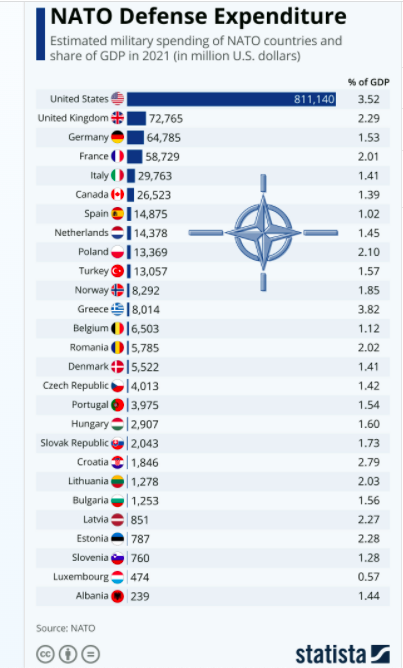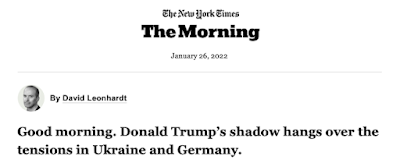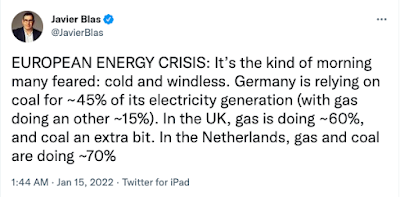Russia has amassed 125,000 troops along the Ukraine border amid concerns from some in the West that it has designs on invading Ukraine.
Joe Biden has threatened harsh sanctions against Russia if it invades Ukraine.
NATO allies in Europe have also warned Russia about moving aggressively against Ukraine.
One NATO country that has not is Germany.
I find that interesting in that Germany was originally a large reason that NATO was formed after World War II. NATO's mission was to insure that the communists of the Soviet Union would not threaten free and democratic nations in Europe beyond the foothold they already had in East Germany and Eastern Europe.
The United States and the NATO countries in Europe pledged to stand together committed to democracy, individual liberty and the rule of law. against the Soviet Russians.
In 1962, NATO members spent an average of 7.1% of their respective national government budgets on defense. The United States spent 8.7%. The UK spent 6.2% and Germany spent 4.8%.
(All of these numbers and those below on NATO spending can be found in this document).
By 1982, that average had dropped to 4.8% overall. The United States spent 6.4%, the UK spent 4.8% and Germany had decreased their defense spending to 2.9%.
The fall of the Berlin Wall in 1989, the reunification of Germany and collapse of the Soviet Union in 1991 changed the perceived threat to the NATO countries.
All of the original countries started reducing defense expenditures. In addition, beginning in the late 1990's many of the countries who used to be controlled by the Soviets (Poland, Czech Republic, Hungary, etc) joined NATO.
 |
| Source: https://www.bbc.com/news/world-europe-18023383 |
The original 12 countries in NATO in 1949 has expanded to 30 today.
Russia argues that its security will be threatened if Ukraine also eventually becomes part of NATO. That is a big reason that Russia wants to insure that the other European countries in NATO do not get too cozy with Ukraine.
In 2005, the average defense expenditures of NATO nations had fallen to 2.7% of GDP. The United States was spending 3.8%, the UK 2.1% and Germany 1.3%.
By 2006, faced with ever decreasing defense expenditures by member nations, NATO established a guideline that all NATO nations needed to spend at least 2% of their GDP on defense to ensure the alliance's military readiness.
When Donald Trump ran for President he made an issue of other NATO members not fulfilling their obligation in meeting the 2% guideline.
The liberal elites and globalist argued that Trump was trying to undermine NATO.
I never could understand how pushing allies to strengthen their defense posture and commitment to NATO was undermining the alliance but such is the "logic" that flows from The New York Times.
I wrote a blog post in February, 2017 to provide context on the NATO issue and how the criticism of Trump was off base.
The current minimum defense expenditure that a member country is supposed to meet as a percent of GDP is set at 2%. However, only 5 out of 28 member states are meeting that target. Of course, the United States is doing much more than that meaning that most NATO members are getting a free ride from us.
This inequality is there for all to see but Donald Trump is the only one willing to talk about it?
And he is then criticized for it by those who say he "doesn't understand" and is putting Europe in danger?
The main purpose of NATO from its inception was for the member countries to defend each other from the possibility of the communist Soviet Union taking control of their nation. Who is more at risk of this occurring---the European countries who are NATO members or the United States?
It would seem since the Europeans are the most at risk that they would be more than willing to pay the bill to defend themselves. Why rely so much on the United States? Is that fair? That is the main point that Trump is arguing.
In 2016, Germany was spending 1.2% on defense expenditures, the UK was 1.8%, Canada was 1.2%, Italy was 1.5% and Belgium was .9%.
The United States was spending 3.2%.
Did Donald Trump have a point or didn't he?
Trump was successful in getting many of the NATO nations to start spending more on defense.
This chart shows NATO defense expenditures as of 2021.
The United States also increased spending on defense under Trump. He didn't just browbeat the other countries to do more and sit back and do nothing in return.
The United States went from 3.2% in 2016 to 3.5% in 2021.
Germany went from 1.2% to 1.5%.
The UK increased spending from 1.8% to 2.3%.
Canada bumped its spending from 1.2% to 1.4%.
Even Belgium went from .9% to 1.1%.
How is this bad for NATO?
However, here comes The New York Times this week arguing that Trump undermined NATO and did little to bolster relations with Germany during his time in office.
The New York Times has therefore decided that the fact that Germany has not been joining its fellow NATO members in showing a united front in condemning Russia for its troop build-up on the Ukraine border is Trump's fault.
It looks to me as if Germany is the one undermining NATO.
Germany’s government, under its new chancellor, Olaf Scholz, has ruled out any arms exports to Ukraine. It is also delaying a shipment of howitzers from Estonia to Ukraine. It may have kept British planes from using German airspace when sending military supplies to Ukraine last week.
Most significantly, the Scholz government has been vague about whether a Russian invasion would lead to the shutdown of an undersea gas pipeline between Germany and Russia. The pipeline, the Nord Stream 2, will become a major source of energy for Germany and a major source of revenue for Russia once it begins operating, likely in the next year. Scholz recently described Nord Stream 2 as a “private-sector project.”
Germany's failure to condemn Russia is Trump's fault?
I have an alternative explanation.
Germany has backed itself into a corner in its reliance on Russian energy.
The lights go out and people will freeze if Russian oil and gas does not make it to Germany.
The reality is that Germany has made itself vulnerable by giving blind allegiance to the climate change alarmists.
It just shut down half of its remaining nuclear plants on December 31, 2021. The others are scheduled to be shut down by the end of 2022.
 |
 |
| Source: https://www.autocar.co.uk/car-news/new-cars/bmw-launch-nine-new-electric-cars-2025 |
 |
| Source: https://ru-geld.de/en/country/weather-and-climate/sunshine.html#by-month |
Some 4.2 million German households will see their electricity bills rise by an average 63.7% this year and 3.6 million stand to pay 62.3% higher gas bills as suppliers pass on record wholesale rates, data showed on Tuesday.
Yes, it is quite a mess.
Germany is finding out it is cold and dark at the climate change altar.
It is hard to blame anyone else for the spot they are in.
I can't blame Joe Biden for Germany's plight. However, he hasn't been much help either with his blundering and inconsistent statements regarding Russia and Ukraine.
He also attempted to mollify Germany by taking the sanctions off of the Nord Stream II pipeline only to find that they are now turning their back on him as he attempts to build support to confront Russia about Ukraine.
Despite what The New York Times thinks, Donald Trump is blameless. He tried to help Germany to help themselves but they just let themselves grow more dependent on Russia trying to follow the climate change agenda.
It seems that Germany has also forgotten a lot of history if they somehow think that Russia is their friend.
It will not be the first time that Germany has made a major miscalculation.







No comments:
Post a Comment